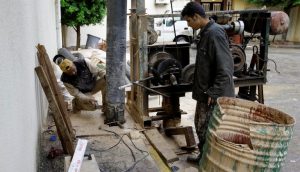
In the land of black gold, water no longer flows. Since the beginning of the summer, the Libyan capital has experienced no less than five major water cuts. The first one on May 20, at dawn. As the city wakes up, #WaterlessTripoli is gaining momentum on Twitter.
“How do I explain to my family that they have to go to the mosque to wash?” asked one angry social media user. These interruptions are in addition to frequent power outages. At the end of July, when the mercury hit over 35°C and most parts of the capital had to cope with just three hours of electricity a day, Tripoli’s taps ran empty for several days.
Political leverage
Admittedly, the front line is dozens of kilometres from the centre of the capital, which has been besieged by the Libyan National Army (LNA) of Khalifa Haftar since 4 April. But the resource war has invaded Tripolitan homes. In fact, the problem has been endemic since 2011, due to the inevitable degradation of infrastructure. “Foreign technicians no longer dare to set foot here for security reasons, and all modernization contracts – such as the project to build three desalination plants between Tripoli and Misrata – remain blocked despite the huge investment opportunities,” says Farraj al-Amari, former Director of Planning at Tripoli’s Ministry of Electricity and Water.
The collateral damage of the Libyan security situation is not solely to blame. National resources are also one of the central issues in the civil conflict. Their poor management crystallizes the tensions of a country, divided between clans and tribal groups, that has never made peace with its past.
“Since 2011, and especially during periods of war, water and electricity resources have been a political lever. Armed groups know this. And they exploit it for community or personal claims,” explains Lazib Mohamed Essaïd, a doctoral student at the French Institute of Geopolitics and an expert on Libya. In Tripolitania, controlling access to water and electricity is a powerful means of applying pressure against an increasingly inoperative government.
Collective punishment
In some cases, the cuts are similar to a collective sanction for the inhabitants. This is precisely what happened in May, when a pro-Gaddafi militia, now affiliated with Marshal Khalifa Haftar, voluntarily closed the Jabal al-Hasawna pumping station in the southwest of the country, blocking one of the networks serving the capital. The sabotage organized by Khalifa Hanaish, who heads the armed group, had a specific objective: to obtain the release of his brother, a military leader detained by a rival militia from Tripoli.
The capital, like other cities from the coast to Benghazi, is 95% dependent on water pumped in the south of the country, where the Nubian Basin is located, a water table shared by Libya, Egypt, Sudan and Chad. Discovered in 1953 during an oil exploration campaign, this underground basin was exploited by Muammar Gaddafi to carry water from the desert to the coast via the Great Man-Made River, the largest irrigation project in the world.
“Potential war crimes”
Since 2017, the LNA has made several attempts to advance southwest before turning north. In February, Khalifa Haftar finally managed to seize this strategic area, claiming its resources. “It is no coincidence that, in his progress, the Marshal followed the route of the main oil fields. The area corresponds to the area where the GMR [Great Man-Made River] extends,” notes analyst Djidel Hocine.
Consequently, the Government of National Understanding (GNA) of Fayez al-Sarraj, attributed deliberate water cuts to the Eastern Marshal, accusing him of causing a humanitarian crisis in the besieged enclave. “This summer, groups allied to Haftar in the southern part of the capital intentionally targeted water stations at least twice,” points Abdelkader Lahouili, a member of the Tripoli State High Council.
A United Nations press release has clearly described these as “attacks” and “potential war crimes” against civilians but stopped short of naming a perpetrator.
For their part, the LNA denies any involvement. Is Khalifa Haftar denying water to the population to win the battle? “He would have the means to do so, but the international community is watching him. Haftar still has a lot to lose in diplomatic matters. At the moment, he cannot afford to be likened to a war criminal,” says Jalel Harchaoui.
Political dividends for Haftar?
If the marshal is not directly involved in these sabotage operations, he seems to tolerate them when they are the work of local forces that support him. Any dysfunction in Tripoli works in his favour: a deterioration of the security situation, water and electricity cuts and poor infrastructure management. All of it fuels the frustration of a population deprived of essential goods.
As Abdelkader Lahouili confirms, “the situation has deteriorated with the war. The companies that manage the power plants around the capital are Turkish [Turkey supports the Tripoli government]. Technicians become a target, and the government can no longer access these areas. At the moment, the security issue remains a priority,”.
But in the long term, Haftar may well recover the political dividends of this situation. For Jalel Harchaoui, “the war is not progressing as the Eastern Marshal wished. If the GNA were to fall because the population rejects it, it would give [Haftar] a huge advantage”.
